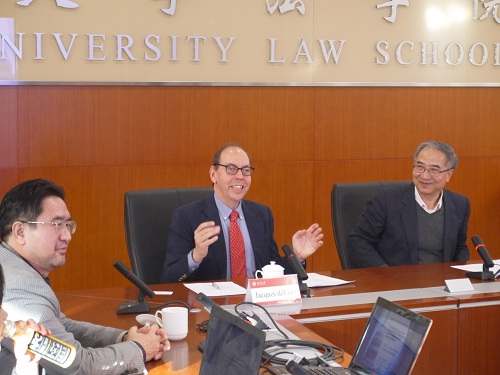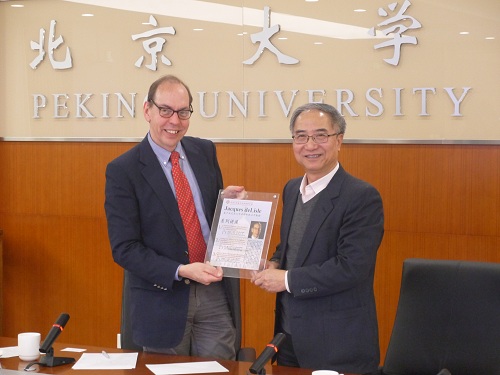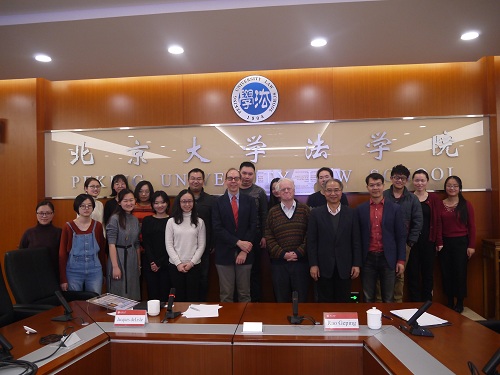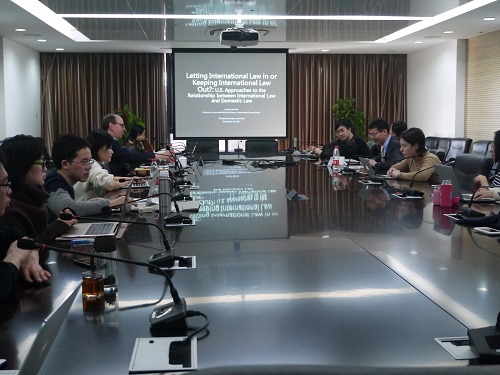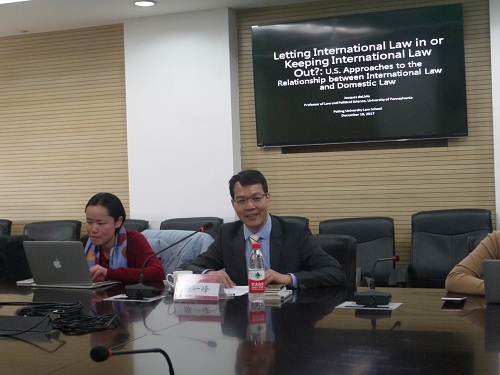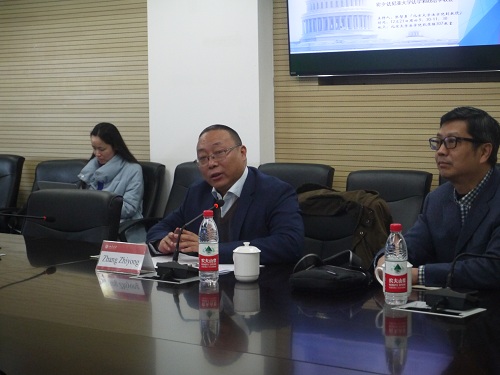The Series of Lecture Delivered by Prof. Jacques of UPennLS Held Successfully
Date:2017-12-25
Professor Jacques deLisle, the well-known expert of comparative law and Chinese law from the University of Pennsylvania, visited Peking University School of Law and set up a series of lectures from December 14 to December 22, 2017.
Prof. Jacques deLisle who is fluent in Chinese and French teaches law and political science at the Law School of Pennsylvania University. He has also served as an expert advisor on Chinese legal issues and government policy on many occasions. Professor has done a lot of in-depth research in China’s judicial reform, cross-Straits relations, Sino-U.S. relations, and Hong Kong’s political status quo.
At 15:00 on December 15, 2017, Lecture“The End of American Legal Globalism: U.S. Approaches to International Law from Obama to Trump” was delivered by Prof. Jacques in B102 meeting room, Koguan Building, PKULS, while Prof. Rao Geping from PKULS was the Host. Based on rich cases and practices, the Prof. analyzed American government's evolution in international law policy from the perspectives of the Law of Armed Conflict, International Trade Law, International Human Rights Law, International Environmental Law, International Criminal Law, and Cyber Security Law. On the one hand, the U.S. international law policy is undergoing a tremendous transformation. The U.S. is no longer willing to serve as a leader in promoting international law, and has turned from globalism to unilateralism. On the other hand, we should calmly respond to this change and realize that Obama’s political legacy and Trump’s reversal are limited. In the end, the professor explained through international relations theory that although there are worrisome aspects in the shift of international law, there is still hope for the future.
At 15:00 on December 18, 2017, the second lecture“The U.S. Faces a Rising China: Implications for International Law, with examples from international economic law and maritime issues”was held in classroom 307, Koguan Building, PKULS, and Prof. Chen Yifeng served as the host. The Prof. believes that from a perspective, international law is integrated with domestic laws with the support of national leaders and has a far-reaching impact on domestic laws. On the contrary, international law is hindered by factors such as the constitution and political structure. Being part of domestic law also faces the risk of being limited to interpretation. Finally, Prof. Jacques analyzed the root causes of the complex attitude of the U.S. towards international law and domestic law and pointed out its implications for China’s future international law policy.
The last lecture“The U.S. Faces a Rising China:Implications for International Law, with examples from international economic law and maritime issues”was held on the morning of December 21 in class 307, Koguan Building, PKULS, while Prof. Zhang Zhiyong from PKULS was the Host. Prof. Jacques first explained to the audience that the U.S. is currently the defender of the existing state of international law, while China has become the challenger and corrector of the status quo. However, the Prof. also reminded: First, China and the U.S.have their own rational basis, and there is no absolute right or wrong; Second, the U.S. lacks respect and support for many rules of international law, while China does not necessarily pose a negative challenge to the international legal order. Finally, with the unilateral turn of the U.S., China is holding the right to choose: to adapt to the old order or to establish a new order?
This series of lectures also attracted the participation of law scholars from many universities in Beijing. In the Q&A session after each lecture, the audience and Prof. had a lively discussion on academic issues and the world situation. The professor's fluent Chinese also surprised everyone. In the end, this series of “Peking University Outstanding Experts' Lecture Program” successfully concluded in the applause of teachers and students.
Translated by: Lu Liangchen
Edited by: Ding Jieyao




